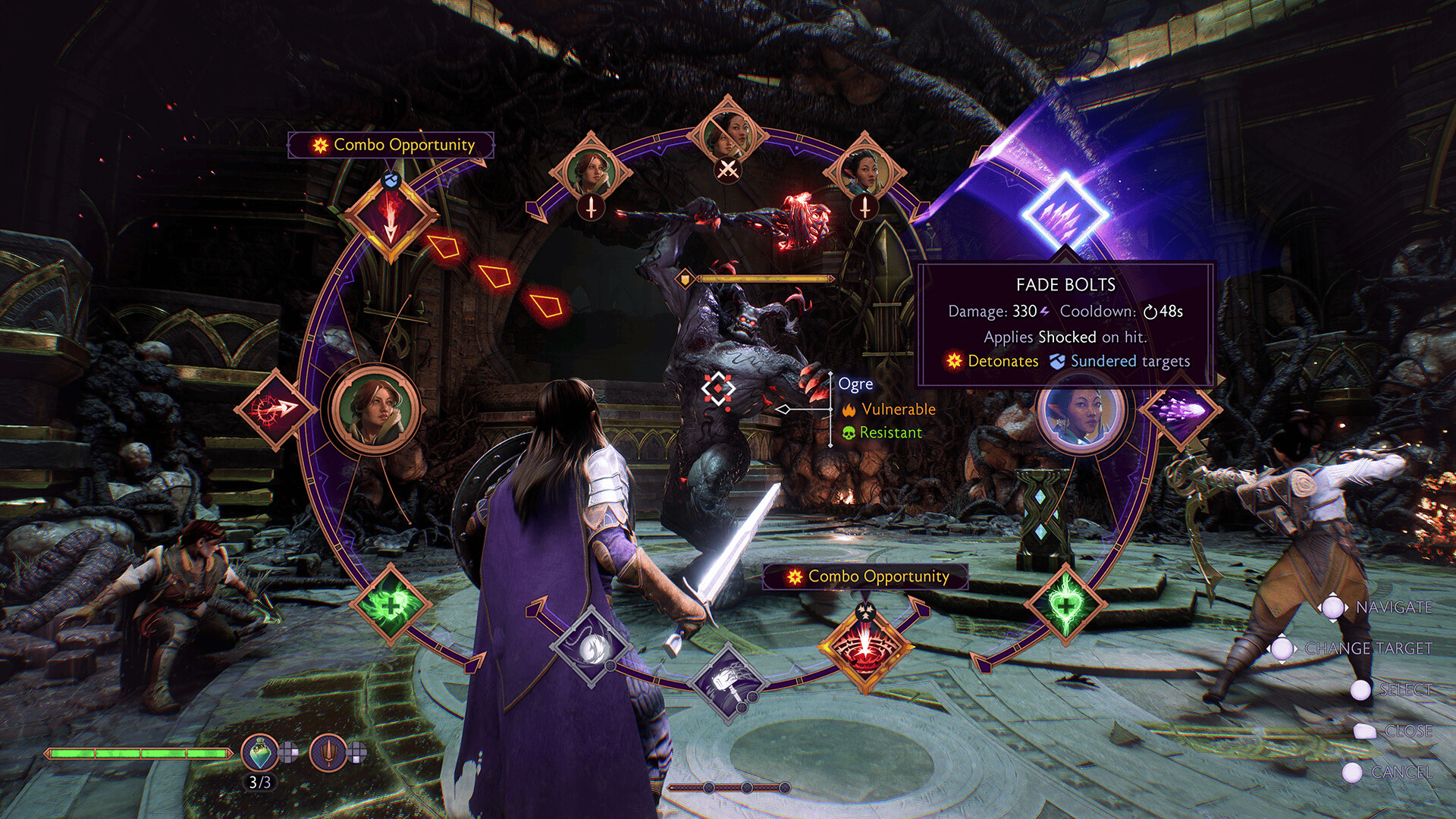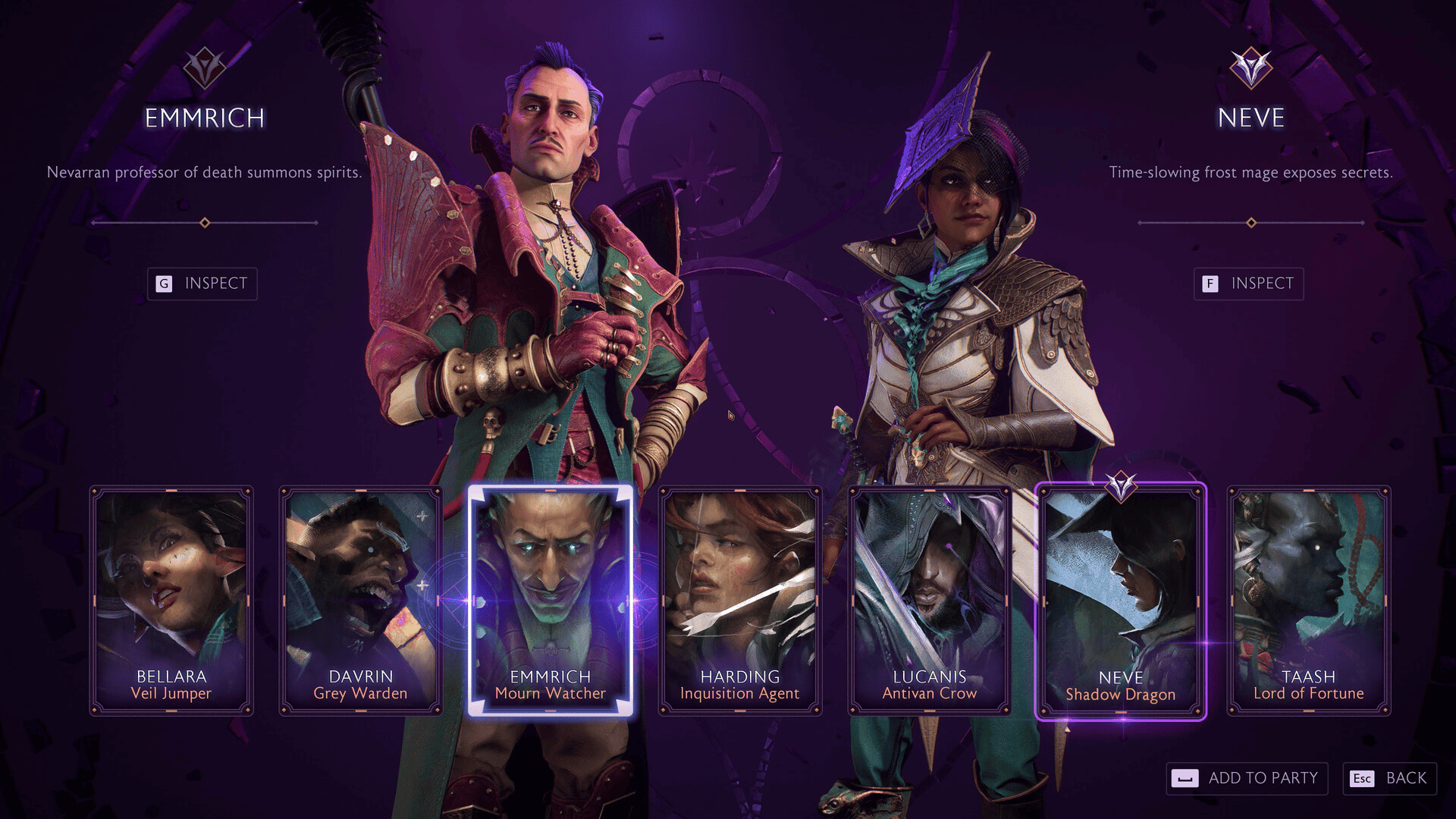After IGN recently reported that EA’s CEO stated The Veilguard failed to ‘resonate with a broad audience’ because gamers increasingly want ‘shared-world features,’ the entire community reacted strongly on forums like X and Reddit. Dragon Age fans specifically voiced their discontent with Electronic Arts’ suggestion that Dragon Age: The Veilguard would have performed better as a live service game.
The latest installment in the beloved RPG series did not meet EA’s financial expectations, resulting in significant layoffs at BioWare. Fans argue that the game’s underwhelming reception was due to poor writing and storytelling, not the absence of multiplayer elements. EA’s chief financial officer, Stuart Canfield, suggested that The Veilguard might have fared better with live service features, a statement that has sparked controversy within the Dragon Age community.

Long-time fans of the series prioritize its rich storytelling and immersive single-player experiences, rejecting the idea that multiplayer or live service components would have improved the game. Critics and players alike have noted that The Veilguard’s main issues stemmed from shortcomings in its narrative and lack of depth. The game received mixed reviews, with many expressing disappointment in its story and character development. These elements have traditionally been the cornerstones of the Dragon Age franchise, and their absence in The Veilguard left many fans feeling let down.
The Dragon Age Dilemma: Story vs. Service
What Went Wrong with Dragon Age: The Veilguard?
Dragon Age: Veilguard hasn’t met sales expectations, and EA’s CEO has pointed to the lack of “shared-world features” as the reason. This explanation has been met with skepticism and outright rejection by the Dragon Age fanbase. Many players feel the game’s shortcomings lie elsewhere. They point to weak writing, shallow characters, and a departure from the series’ established tone as the real culprits. The game’s story felt “safe” and lacked the complex moral choices and gritty realism that defined previous Dragon Age titles.
Character Concerns
Fans have expressed disappointment with the character development in Veilguard. Many found the characters bland, uninteresting, or even annoying. Some feel the writing focused too much on surface-level representation rather than creating compelling and relatable characters. This is a stark contrast to the richly developed characters of Dragon Age: Origins and Dragon Age II, which are still praised for their depth and complexity.

Story Shortcomings
The narrative of Veilguard also drew criticism. Players felt the story lacked focus and failed to capture the epic scope and political intrigue that made previous Dragon Age games so engaging. Some felt the plot was predictable and lacked meaningful choices. They wanted a story that respected the lore and history of Thedas, not one that felt watered down or generic.
Gameplay Issues
Beyond the story and characters, some players also found the gameplay in Veilguard to be lacking. They described it as repetitive and uninspired, failing to offer the tactical depth and strategic challenge they enjoyed in earlier Dragon Age games.
What Do *Dragon Age* Fans Really Want?
The backlash against EA’s “shared-world” explanation highlights a disconnect between the company’s perception of player desires and what fans actually want. The success of single-player RPGs like Baldur’s Gate 3 demonstrates a clear demand for story-driven, character-focused experiences. Many Dragon Age fans aren’t looking for multiplayer or live-service elements. They want well-written stories, compelling characters, and engaging gameplay that respects the series’ roots.
The Importance of Story
For many Dragon Age fans, the story is paramount. They want a narrative that draws them into the world of Thedas, introduces them to memorable characters, and presents them with difficult choices that have real consequences. They want a story that explores complex themes and doesn’t shy away from mature or controversial topics.

Character-Driven Narratives
Compelling characters are essential to a good RPG. Players want characters they can connect with, characters who have their own motivations and flaws, and characters who grow and evolve throughout the story. They want characters who feel real, even in a fantasy setting.
Engaging Gameplay
While story and characters are important, gameplay is also a crucial element of the RPG experience. Players want a combat system that is challenging and rewarding, one that allows them to experiment with different builds and strategies. They want exploration, meaningful choices, and a sense of progression.
The Live Service Dilemma
The debate surrounding Dragon Age: Veilguard also touches on the broader issue of live service in gaming. While some live service games have been successful, many others have failed to meet expectations. Players are becoming increasingly wary of games that prioritize monetization and ongoing content updates over delivering a complete and satisfying experience at launch.
Pros and Cons of Live Service
Live service games can offer several benefits, such as regular content updates, community events, and long-term support. However, they also have drawbacks, such as a focus on microtransactions, repetitive gameplay loops, and the potential for “pay-to-win” mechanics.
The Future of *Dragon Age*
The future of the Dragon Age franchise remains uncertain. EA’s response to Veilguard‘s performance suggests a continued focus on live service, which could alienate the series’ core fanbase. Whether EA will ultimately listen to fan feedback and prioritize story and character development remains to be seen.
Table of Player Desires vs. EA’s Focus
| Player Desires | EA’s Focus |
|---|---|
| Compelling stories | Shared-world features |
| Well-developed characters | Live service elements |
| Meaningful choices | Monetization |
| Engaging gameplay | Broad audience appeal |
| Respect for lore | Recurring revenue streams |
Learning from Other RPG Successes
The success of games like Baldur’s Gate 3 offers valuable lessons for developers. These games demonstrate that there is still a large audience for well-crafted, single-player RPGs. They prove that players value story, characters, and meaningful choices. They show that developers can create successful games without relying on live service models or aggressive monetization. Divinity: Original Sin 2 and Disco Elysium also highlight the demand for deep, narrative-focused RPGs.
The ongoing conversation about *Dragon Age: Veilguard* and its perceived shortcomings serves as a reminder that game development should be driven by a passion for creating compelling experiences, not just by a desire to maximize profits. While the “shared-world” debate is interesting, it misses the point. The core of any good RPG is a good story. The rest is just window dressing.
Key Takeaways
- Fans attribute Dragon Age: The Veilguard’s poor performance to weak storytelling, not lack of live service features
- EA suggested live service elements could have improved the game’s reception, sparking controversy
- The Dragon Age community values rich narratives and immersive single-player experiences in the series
The Heart of Dragon Age: Story vs. Service
Dragon Age’s identity hinges on rich storytelling and deep character development. The debate between narrative-driven experiences and live-service models has significant implications for the series’ future.
Narrative Focus in Single-Player RPGs
Dragon Age built its reputation on compelling narratives and character-driven stories. The series excels in crafting immersive worlds filled with complex characters and moral dilemmas. Players invest emotionally in their choices, shaping the storyline and relationships.
BioWare’s strength lies in creating memorable companions and intricate plots. This approach allows for deeper exploration of themes and personal character arcs. Single-player RPGs offer a complete, self-contained experience without the need for ongoing content updates.
The Veilguard aimed to continue this tradition but faced challenges in execution. Critics pointed to weaker writing as a key factor in the game’s lukewarm reception.
Live Service Concerns and Player Expectations
EA’s push for live-service elements in Dragon Age raised concerns among fans. Live-service games focus on continuous updates and multiplayer features. This model often clashes with the narrative depth expected from RPGs.
Players worry about:
- Microtransactions affecting gameplay
- Reduced focus on story quality
- Disconnected multiplayer elements
The Veilguard’s development struggled with balancing these elements. Attempts to incorporate live-service features reportedly hindered the game’s narrative focus. Fans expressed disappointment, feeling the core Dragon Age experience was compromised.
EA’s emphasis on recurring revenue models conflicts with player expectations for a story-rich, single-player adventure.
Bioware’s Legacy with Dragon Age and Mass Effect
BioWare built its reputation on creating epic RPGs with memorable characters and choices. Both Dragon Age and Mass Effect showcased the studio’s storytelling prowess. These franchises set high standards for narrative-driven games.
Key strengths include:
- Complex moral choices
- Deep character development
- Expansive lore and world-building
The success of these series stems from BioWare’s focus on crafting engaging single-player experiences. Fans expect each new entry to build upon this legacy of rich storytelling and player agency.
The Veilguard’s reception highlights the importance of maintaining BioWare’s core strengths. Players value the studio’s ability to create immersive worlds and meaningful narratives over live-service elements.
Community Voices and Industry Trends
Players and industry experts have voiced strong opinions on live-service games and their impact on beloved franchises. Recent shifts in the gaming landscape have sparked debates about the future of single-player experiences.
Player Feedback on Live Service Models
Gamers have expressed frustration with live-service elements in traditionally single-player franchises. Many Dragon Age fans criticized EA’s push for multiplayer features in The Veilguard. Players cited a preference for rich storytelling and character development over shared-world mechanics.
Forums and social media platforms filled with complaints about microtransactions and gear-focused gameplay. Fans worried these elements would detract from the narrative-driven experience they expected from Dragon Age.
Some players drew comparisons to Anthem, another BioWare title that struggled with its live-service model. They feared similar issues could plague future releases like Mass Effect 5.
Recent Shifts in Gaming Landscape
The gaming industry has seen a trend towards live-service games, inspired by successes like Fortnite. However, recent releases have challenged this model’s dominance.
Single-player games like Elden Ring and God of War Ragnarök achieved critical and commercial success. These titles proved that story-driven experiences still have a significant market.
Suicide Squad: Kill the Justice League faced backlash for its live-service elements. This reaction highlighted growing player fatigue with the model.
Several studios announced a return to traditional single-player games. This shift suggests a reevaluation of the live-service approach within the industry.
The Financial Anatomy of Live-Service Games
Live-service games aim to generate long-term revenue through microtransactions and continuous updates. EA’s CEO Andrew Wilson emphasized the potential for “deeper engagement” and ongoing monetization.
However, The Veilguard’s underperformance suggests flaws in this strategy. The game failed to meet EA’s player count expectations, reaching only half its 3 million player goal.
Development costs for live-service games often exceed those of traditional titles. Ongoing support and content creation require significant resources.
The competitive market for player attention makes sustained success challenging. Games like EA Sports FC must constantly evolve to maintain their player base and revenue streams.
What People Are Saying About The Game
Dragon Age: The Veilguard failed because it didn’t include “shared-world features” and that gamers increasingly desire such features. The overwhelming sentiment from players is that the game failed because:
- Poor writing and characters: Many users criticize the story, dialogue, and character development, calling it “cringe,” “bland,” and “safe.” They feel it lacked the depth and maturity of previous Dragon Age games.
- Repetitive gameplay: Some commenters found the gameplay repetitive and unengaging.
- Shift in tone and style: Several users feel the game deviated too much from the established tone and atmosphere of the Dragon Age series, becoming too lighthearted and generic.
- Lack of respect for lore: Some feel the game disregarded established Dragon Age lore.
- Misunderstanding of player desires: The majority of commenters explicitly state they do not want shared-world features in Dragon Age and that the CEO is misinterpreting player feedback. They argue that the success of single-player RPGs like Baldur’s Gate 3 proves the demand for single-player experiences.
- Focus on monetization over quality: Many users accuse EA of prioritizing monetization and live-service elements over creating a quality game.
Frequently Asked Questions
Dragon Age fans have voiced concerns about live service models and writing quality in recent titles. They seek alternatives that prioritize storytelling and single-player experiences.
What are the major concerns fans have expressed about live service in Dragon Age: Veilguard?
Fans worry that live service elements could detract from the core RPG experience. They fear microtransactions and ongoing content updates might fragment the narrative. Some players prefer complete stories at launch rather than episodic releases.
Many Dragon Age enthusiasts value immersive single-player campaigns. They are wary of multiplayer components that could divert resources from story development. Fans also express concerns about potential always-online requirements.
How has the writing quality in recent Dragon Age titles impacted fan expectations for Dragon Age: Veilguard?
Recent Dragon Age titles have received criticism for their writing quality. Fans felt character development and plot coherence suffered in Dragon Age: Inquisition. This has led to heightened scrutiny of Veilguard’s narrative.
Players expect deep, branching storylines with meaningful choices. They hope for a return to the complex character interactions seen in earlier games. Improved dialogue and more nuanced quest design are high on fans’ wishlists.
Are there specific elements that fans feel are lacking in the Dragon Age series that have led to a pushback against live service models?
Fans miss the depth of origin stories from the first game. They want more varied dialogue options and consequences for their choices. Some players feel recent titles have simplified gameplay mechanics too much.
World-building and lore exploration are crucial for many Dragon Age enthusiasts. They worry live service models might prioritize short-term engagement over rich, expansive narratives. Fans also desire more diverse romance options and companion interactions.
How do player-community feedback mechanisms influence the development of EA’s Dragon Age: Veilguard?
EA has shown interest in player feedback through forums and social media. Developers have conducted surveys to gauge fan preferences. This input has influenced decisions about game features and content.
Community managers actively engage with fans on platforms like Reddit and Twitter. They relay concerns and suggestions to the development team. However, some players feel their voices are not heard enough, especially regarding live service elements.
What alternatives to live service models are being proposed by fans of the Dragon Age series?
Many fans advocate for a return to traditional single-player RPG models. They suggest focusing on expansive DLC packs rather than ongoing microtransactions. Some propose optional multiplayer modes separate from the main campaign.
Players recommend investing in mod support to extend the game’s lifespan. They also suggest incorporating player choices from previous games to create a more personalized experience. Fans emphasize the importance of complete, polished releases over early access or continuous updates.
How might the inclusion or exclusion of multiplayer components affect the future of the Dragon Age franchise?
Multiplayer inclusion could broaden the game’s appeal to new audiences. It might provide additional revenue streams for continued development. However, fans worry it could dilute the single-player experience.
Excluding multiplayer allows developers to focus entirely on crafting a rich, story-driven world. This approach aligns with the series’ roots and fan expectations. It may result in a more cohesive narrative but could limit long-term engagement for some players.







